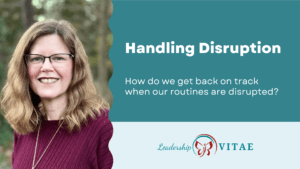
With the great resignation, a lot of folks left less than ideal conditions and pay for new opportunities. According to a study by Joblist in 2022, as much as 25% subsequently regretted making the change.
The reality is that no opportunity is perfect. There is no ideal company, culture, role, or boss. I’d love to be proven wrong, but even the best fit is going to occasionally rub the wrong way. Require some sort of compromise.
The good news is that there is one constant in every situation. Ourselves. We are the one thing that we carry with us everywhere we go in everything we do. And we are evolving creatures that can adjust and adapt.
When we take on a new role, we may fear that we’ve made a bad decision. Will this be the right place for me? Did I make a mistake? What if I don’t like my boss or my coworkers?
By leaning into our ability to learn and grow, we can transition that fear into empowerment. Take steps to move from worry to making the environment a better fit.
A role, organization, or manager may not be perfect, but we can do our part to make it more manageable.
Learn and unlearn
Since we are the only constant in every situation, we can create a new experience when we change roles. We can also inadvertently recreate the same conditions we just left.
Ahead of changing roles or companies, it’s worth taking a personal inventory. Really knowing ourselves and the situation we’ve found ourselves in. What attracted us to this role, company, or manager? What habits or conditioning have we picked up and do we want to keep them?
While we are the sum of our experiences, we are more than that. We can decide what we want to carry with us and lean into the best version of ourselves. That may mean letting go of that which no longer serves us.
Sometimes we need a break to unlearn harmful patterns. Two months between my last role and my current one were key to identifying and letting go of a negative mindset I risked taking with me. I was fortunate to be able to take that time.
Historically I have ended one job on Friday and started a new one Monday. If it’s possible to even take a week or two between roles, it’s time well spent to reflect and reset.
Ask for what you need
As we know ourselves, we then have an opportunity to let others know us as well. It may be tempting to keep information to ourselves and let new leaders guess what works for us.
That’s a path to failure.
Leaders aren’t magicians; they don’t read minds. If there’s something we need to be more engaged or productive, we can let them know. Our manager will either succeed temporarily by accident or fail spectacularly when they interact with us from a place of ignorance.
By letting others know what works best for us, we help both parties interact with intention toward a successful outcome. Maybe we let them know and we don’t get what we need. Then we’ve learned something.
Most managers want to lead and develop their people but may not know how to best lead you. So train them.
You are half the relationship. Take ownership of how you show up and give them guidance on how they can best show up for you.
Push back
If we are struggling with the role, manager, or company culture, we can leave. We can also push back. During the great resignation, it was easier to leave than to challenge the status quo. However, we are just leaving a challenging environment behind for others.
This one is easier said than done, depending on our personal circumstances, financial security, and the job market. However, when we set expectations and boundaries, we better advocate for ourselves and others that may find themselves in the same situation.
We do not have to accept whatever we receive as our due. The reality is that we are paid to deliver a product or service. Yes, we receive (hopefully fair) compensation for that work, but the environment we operate in matters.
It can make the difference between high-quality delivery in a reasonable time, or not.
Pushing back might look like negotiating contact after hours or weekends. It may mean Negotiating start and end times, or days in the office vs remote.
Whatever we are pushing back on, it’s worth trying to tie it back to the benefit of the organization if possible.
Case study
As a military kid, I’m used to moving around and constant change. I’ve carried that mindset into my career. While I’ve stayed in organizations for long periods of time, they have been places that let me move around.
As a result, if I find a struggle in one group or company, I will consider moving on. While that can be healthy and good for our careers in the form of pay raises and varied work experience, it’s not great for learning how to handle challenging environments.
I have found myself in situations where it would be financially difficult for me to leave, or I was locked into a committed timeframe. These experiences forced me to take on challenging leaders and cultures head-on. And I’m the better for it.
With one manager, I started to feel uncomfortable during our interactions early in our relationship. I was being micro-managed and could feel myself withdrawing. This is the first step before I initiate a change.
There were three choices as I saw it. I could let it continue and feel resentment, I could leave, or I could say something to shift the dynamic.
While we were new to each other, I took the risk and spoke up. Shared how I could feel more engaged. “This feels like a lot of tasks and I’d love to understand what’s driving them and co-create an overall approach with you.”
Was it perfect from that day out? No. But by sharing how I was experiencing our relationship, he could decide whether that’s what he intended. I would either win, in the form of more autonomy, or I’d learn and be able to leave with a clear conscience. Still a win.
Know when to fold ‘em
Kenny Rogers had it right. We need to know when to hold ‘em and when to fold ‘em. While it’s rare to get the perfect hand, we can work with what we have, or accept it’s unwinnable and wait for the next at play.
Our careers are no different. We don’t have to stay where we aren’t fulfilled, challenged, supported, or recognized. Yet there is so much we can learn by knowing ourselves, letting people know us, advocating for what we need, and pushing back on what’s not working.
These are lessons we can take with us throughout our careers. Ones we can use to make each role change a relief, instead of a regret.








